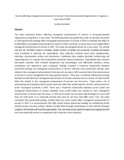| dc.contributor.author | Candiru, Hamidah | |
| dc.date.accessioned | 2018-08-07T08:55:23Z | |
| dc.date.available | 2018-08-07T08:55:23Z | |
| dc.date.issued | 2012 | |
| dc.identifier.uri | http://hdl.handle.net/20.500.12305/323 | |
| dc.description | A Dissertation submitted to the Higher Degrees Department in partial fulfillment of the requirements for the award of the Master’s Degree in Management Studies (Human Resource Management) of Uganda Management Institute | en_US |
| dc.description.abstract | The study examined factors affecting managerial advancement of women in non-governmental organizations using DED as a case study. The following objectives guided the study: to examine the extent to which patriarchal settings affect managerial advancement of women in DED; to establish the effect of double blind on managerial advancement of women in DED; and lastly, to assess how social capital affects managerial advancement of women in DED. This study was designed based on a case study. The sample size was 44. Stratified random sampling, simple random sampling and purposive sampling techniques were employed in selecting the respondents. Data collection methods used were; questionnaire, interview, documentary review and observation. Qualitative data analysis involved summarizing and organizing data in a manner that respondents answered research questions. Quantitative data involved descriptive statistics, that included frequencies and percentages, and inferential statistics, whose correlations and regressions were compared. Findings revealed a moderate relationship between patriarchal settings and managerial advancement of women whereby more patriarchal settings were related to less managerial advancement of women and vice versa. DED is patriarchal in that advancement of women to senior management has been greatly reduced. There was a moderate relationship existing between double blind and managerial advancement of women whereby the occurrence of more double blind was related to less managerial advancement of women and vice-versa. There exists a lot of stereotyping and prejudices about women and men which has worked against women’s advancement to senior managerial positions in DED. There was a moderate relationship between social capital and managerial advancement of women whereby more social capital was related to more managerial advancement of women and vice-versa. In DED social capital has not been well developed as such staff have not built much on it, especially women who even do not have time after work. Thus, the study concluded that patriarchal settings, double blind and social capital affect managerial advancement of women in DED. It is recommended that DED should reduce patriarchal settings by establishing family friendly human resource policies. Reduce double blind through sensitization on the potential dangers caused to the female staff and the organization. And, promote social capital through encouraging the staff and more especially women to appreciate why it deserves more attention. | en_US |
| dc.language.iso | en | en_US |
| dc.publisher | Uganda Management Institute | en_US |
| dc.subject | Managerial advancement | en_US |
| dc.subject | Non-Governmental Organisations | en_US |
| dc.subject | NGOs | en_US |
| dc.subject | Social capital | en_US |
| dc.subject | German Development Services | en_US |
| dc.subject | DED | en_US |
| dc.title | Factors affecting managerial advancement of women in Non-Governmental Organizations in Uganda: a case study of DED | en_US |
| dc.type | Thesis | en_US |

